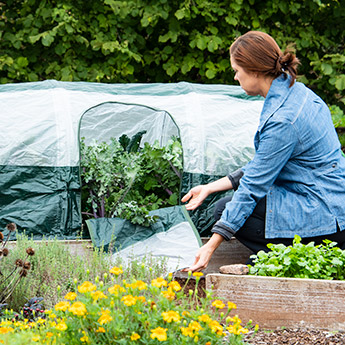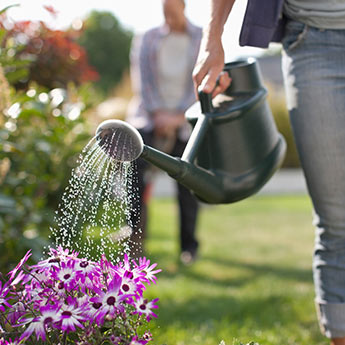Soil Solarization: What it Can and Can't Do
-
Helpful Products from Gardens Alive!
-
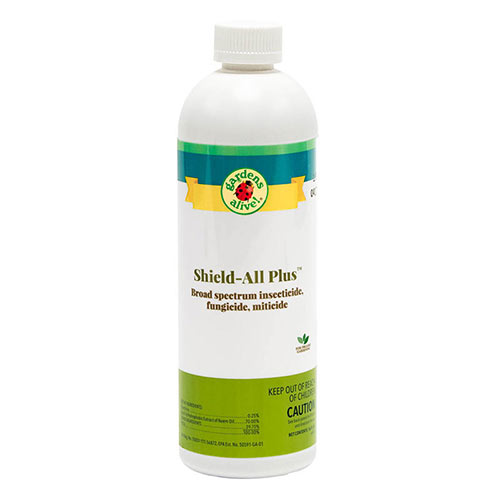 Shield-All Plus™ Pest & Disease Control
Shield-All Plus™ Pest & Disease Control -
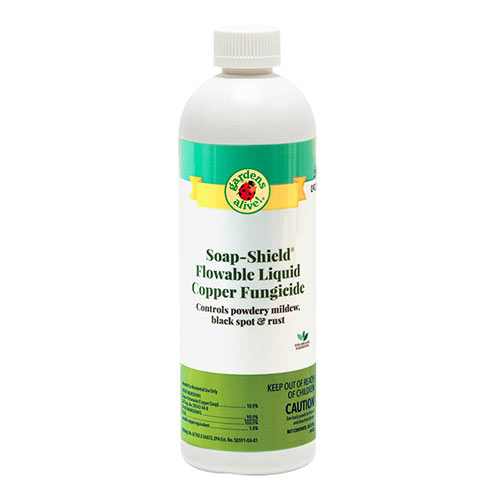 Soap-Shield® Flowable Liquid Copper Fungicide
Soap-Shield® Flowable Liquid Copper Fungicide -
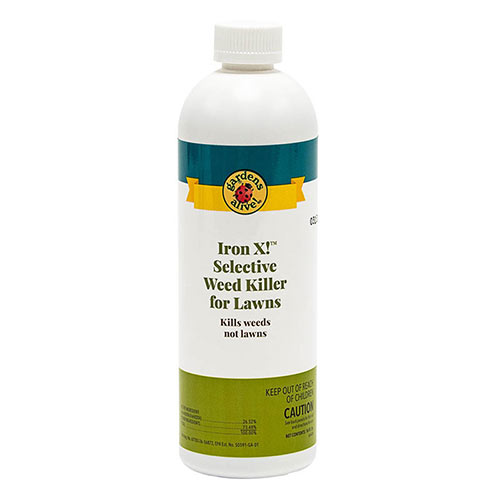 IRON X!™ Selective Weed Killer
IRON X!™ Selective Weed Killer -
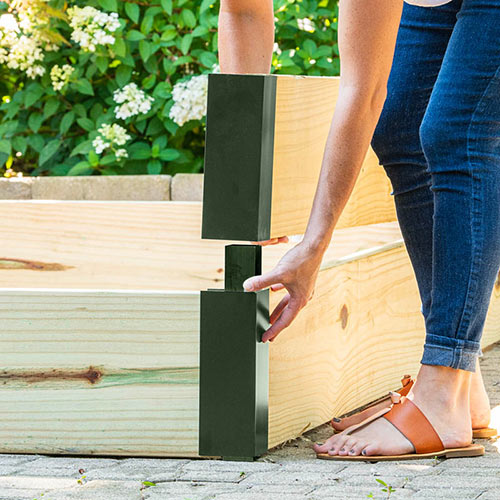 Raised Garden Bed Corners & Extenders
Raised Garden Bed Corners & Extenders
Q. I recently bought a home where the landscape has been neglected for decades and have a question about solarizing a flower bed with a tree in the center. The tree is about the diameter of the circle you make when you touch your fingertip and thumb together. Its surrounded by very thick ground cover and poison ivy. I thought that if I tilled the area, removed the green and brown matter, soaked it with the 100% water saturation you recommend in your article on soil solarization and covered it with the recommended clear plastic one to three mils thick, I'd be able to start fresh. But to do that I'd have to surround the tree with the plastic and I'm afraid that might cook the roots. I love the tree and don't want to hurt it. Any advice?"
---Milan in Lemont, Illinois (25 miles Southwest of Chicago)
A. Yes; first, the poison ivy must be dealt with separately. And not by tilling! If you till an area that contains poison ivy, you will spread the plant's allergenic oil throughout the entire bed and contaminate all of the other tilled weeds and the tines of the tiller. You might even spread enough of the oil throughout the soil to make the very earth itself allergenic. At the very least, it would be an itchy nightmare to try and clear the chopped-up plants away after such a tilling.
Now, to answer the direct question here: you can't solarize such an area without potentially killing the tree in the middle via the root cooking that Milan describes. Heck; the tilling alone might achieve the same end by chopping up the poor tree's roots. But, you know; if you do Milan's fingertip-to-thumb calculation, it indicates a pretty small tree.
So he could remove the tree, heel it in for the season, carefully remove the poison ivy from saturated soil using our plastic bags-instead-of-gloves technique, till up the area, rake up the tilled plant debris, level the soil, saturate it completely, cover it tightly with one to three mil thick clear plastic, solarize the bed and replace the tree in the fall.
A tree that size should be fairly easy to move if you get a bunch of friends over, dig up a really big area around the tree, drop the root ball down on a tarp, carry it over to a new spot on the tarp and "heel it in" by temporarily planting it in a holding area for the summer, preferably in dappled shade to limit the transplant shock….
BUT Milan is half an hour from Chicago, which means a fairly short season, and summer days that rarely get uncomfortably hot. For successful solarization—using the concentrated rays of the sun to destroy weed seeds and disease in the soil—the area in question would have to be in full sun. And the plastic would have to stay on from June through September.
If only Milan were down South or out West! I think you can solarize a bed in something like 17 minutes in Phoenix in the summer. But the technique becomes more demanding as you move North of an area roughly along a curved line heading West from Washington DC. It's easy to solarize in the Carolinas; almost impossible once you get up to the Great Lakes. But if the area does get full sun and Milan gets the tree out of there for the summer, it could work…
BUT. (Yes; that darned But Train is pulling into the station again!)
Soil solarization is a fairly nuclear option. It was created to try and mitigate really extreme situations; tenacious perennial weeds like quackgrass and tough soil diseases like verticillium and fusarium wilt. It's not a first or second-line option.
I'd instead suggest that Milan read over our poison ivy removal instructions and get that dangerous plant out of the area. Then look at what's left behind. It sounds like he could just have a bunch of friends over, host a 'pulling party', cover the cleared area with a single sheet of cardboard to keep old weeds at bay, install six-inch high edging in front, pile compost on top of the cardboard and turn the area around the tree into a nice new raised bed.
It'll be a lot less work—especially if the sun don't shine in his part of Chi-Town. And he'll be able to replant that bed this year instead of next.
---Milan in Lemont, Illinois (25 miles Southwest of Chicago)
A. Yes; first, the poison ivy must be dealt with separately. And not by tilling! If you till an area that contains poison ivy, you will spread the plant's allergenic oil throughout the entire bed and contaminate all of the other tilled weeds and the tines of the tiller. You might even spread enough of the oil throughout the soil to make the very earth itself allergenic. At the very least, it would be an itchy nightmare to try and clear the chopped-up plants away after such a tilling.
Now, to answer the direct question here: you can't solarize such an area without potentially killing the tree in the middle via the root cooking that Milan describes. Heck; the tilling alone might achieve the same end by chopping up the poor tree's roots. But, you know; if you do Milan's fingertip-to-thumb calculation, it indicates a pretty small tree.
So he could remove the tree, heel it in for the season, carefully remove the poison ivy from saturated soil using our plastic bags-instead-of-gloves technique, till up the area, rake up the tilled plant debris, level the soil, saturate it completely, cover it tightly with one to three mil thick clear plastic, solarize the bed and replace the tree in the fall.
A tree that size should be fairly easy to move if you get a bunch of friends over, dig up a really big area around the tree, drop the root ball down on a tarp, carry it over to a new spot on the tarp and "heel it in" by temporarily planting it in a holding area for the summer, preferably in dappled shade to limit the transplant shock….
BUT Milan is half an hour from Chicago, which means a fairly short season, and summer days that rarely get uncomfortably hot. For successful solarization—using the concentrated rays of the sun to destroy weed seeds and disease in the soil—the area in question would have to be in full sun. And the plastic would have to stay on from June through September.
If only Milan were down South or out West! I think you can solarize a bed in something like 17 minutes in Phoenix in the summer. But the technique becomes more demanding as you move North of an area roughly along a curved line heading West from Washington DC. It's easy to solarize in the Carolinas; almost impossible once you get up to the Great Lakes. But if the area does get full sun and Milan gets the tree out of there for the summer, it could work…
BUT. (Yes; that darned But Train is pulling into the station again!)
Soil solarization is a fairly nuclear option. It was created to try and mitigate really extreme situations; tenacious perennial weeds like quackgrass and tough soil diseases like verticillium and fusarium wilt. It's not a first or second-line option.
I'd instead suggest that Milan read over our poison ivy removal instructions and get that dangerous plant out of the area. Then look at what's left behind. It sounds like he could just have a bunch of friends over, host a 'pulling party', cover the cleared area with a single sheet of cardboard to keep old weeds at bay, install six-inch high edging in front, pile compost on top of the cardboard and turn the area around the tree into a nice new raised bed.
It'll be a lot less work—especially if the sun don't shine in his part of Chi-Town. And he'll be able to replant that bed this year instead of next.
-
Helpful Products from Gardens Alive!
-
 Shield-All Plus™ Pest & Disease Control
Shield-All Plus™ Pest & Disease Control -
 Soap-Shield® Flowable Liquid Copper Fungicide
Soap-Shield® Flowable Liquid Copper Fungicide -
 IRON X!™ Selective Weed Killer
IRON X!™ Selective Weed Killer -
 Raised Garden Bed Corners & Extenders
Raised Garden Bed Corners & Extenders





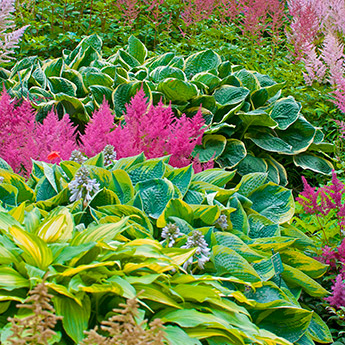
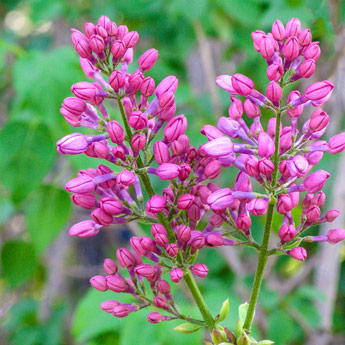
 Gardens Alive! & Supplies
Gardens Alive! & Supplies